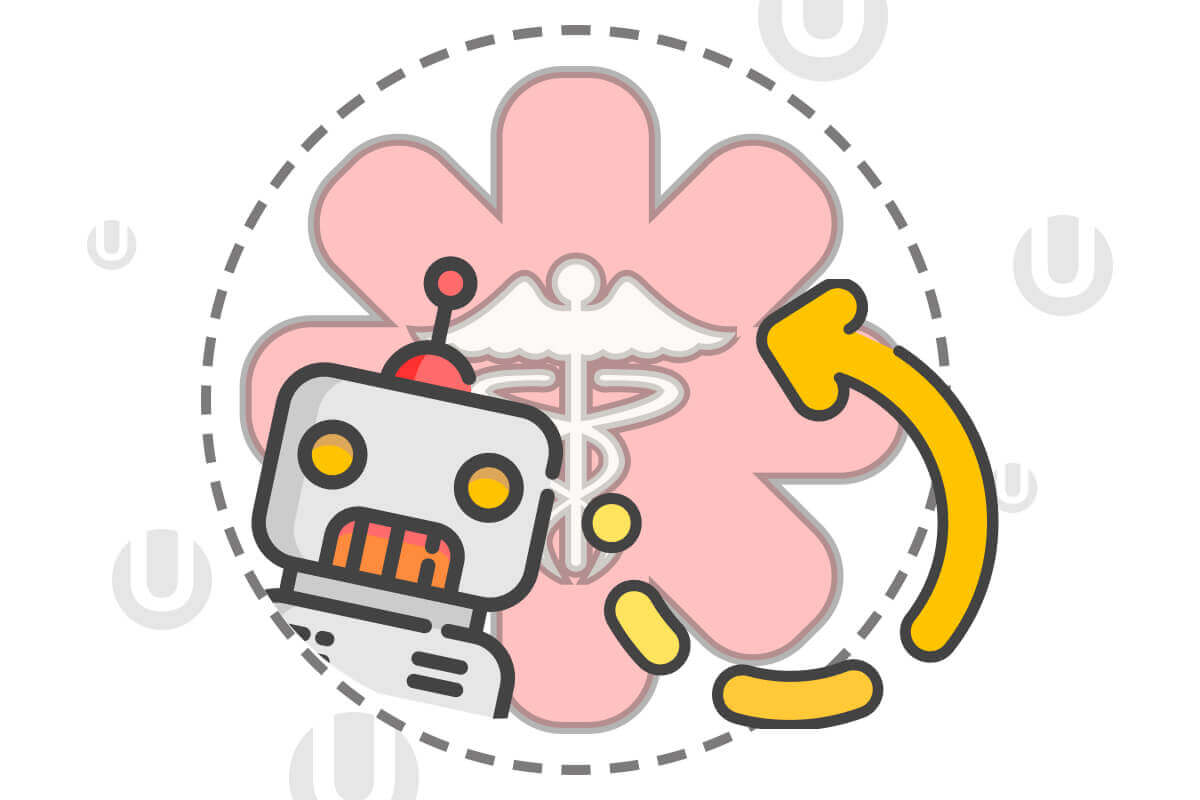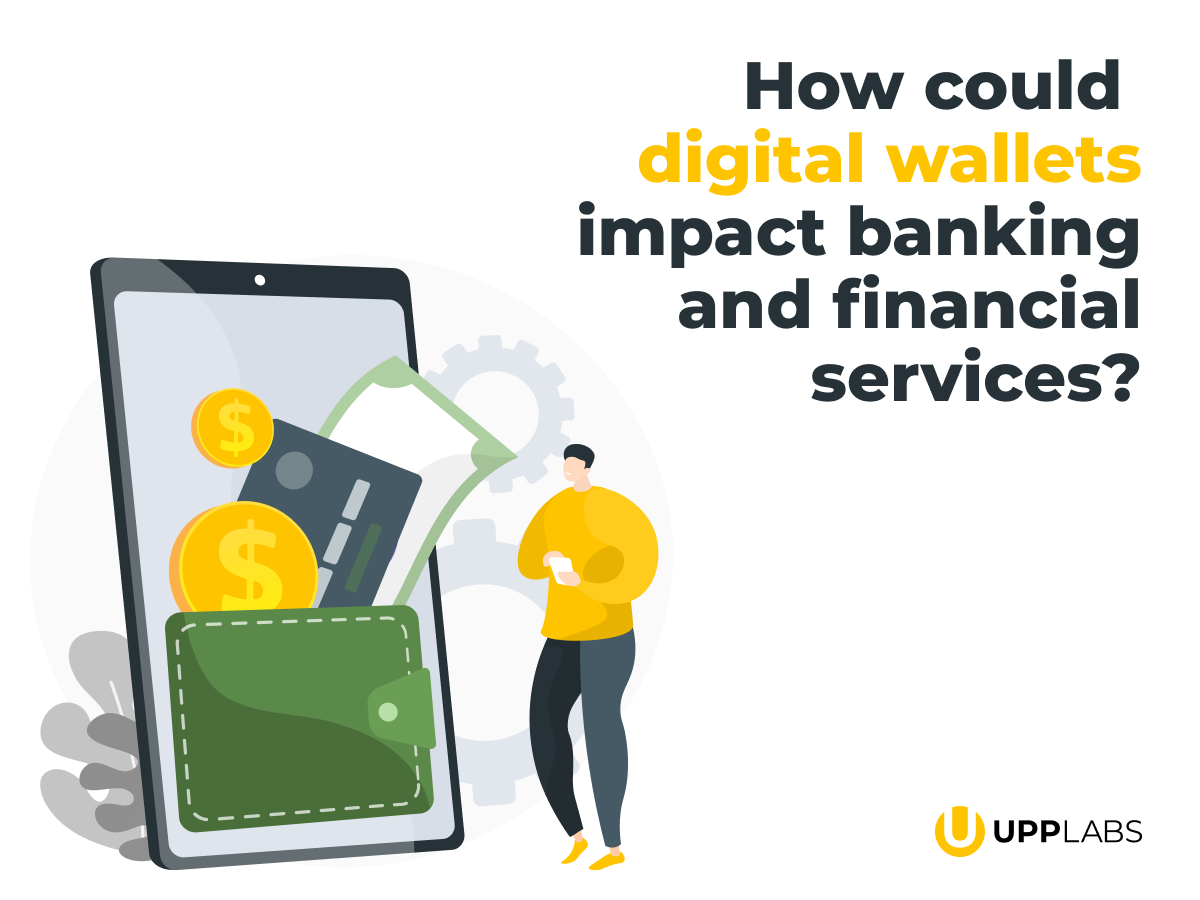Healthcare remains one of the largest and fastest-growing industries in the world. This year, Covid-19 has shown the critical need to deliver innovative and modern healthcare solutions. The entire healthcare industry changes so quickly that you can’t be sure anymore if your legacy software system solves all the problems. Does it integrate with changes or support the new standards? How to find out and what to do next? Why do we need an update and what challenges can we face? This article has the purpose of answering all of these questions.
Digital healthcare
Digital healthcare is a new era of medicine that appeared with the spread of social media and leading technologies such as sensors, artificial intelligence, and robotics. Digital healthcare appeared only in the 2010s, so it is still evolving, as are the challenges that come together.
Patients are motivated by the improvement of their condition. The proactivity of their patients inspires doctors. It means both patients and doctors are actively taking advantage of new technologies. The business needs lead to the creation of new companies and startups. This unique ecosystem can only thrive when appropriate policies are comprehensive and useful.
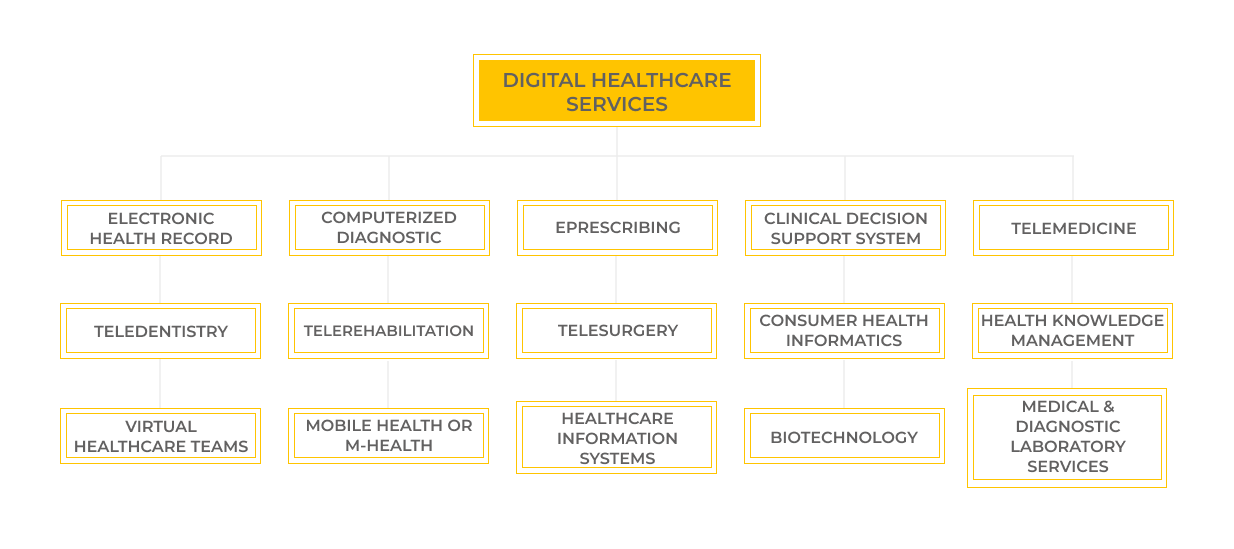
Digital healthcare consists of a range of services or systems, including:
- Electronic health record;
- Computerized diagnostic;
- ePrescribing;
- Clinical decision support system;
- Telemedicine;
- Teledentistry;
- Telerehabilitation;
- Telesurgery;
- Consumer health informatics;
- Health knowledge management;
- Virtual healthcare teams;
- Mobile Health or m-Health;
- Healthcare information systems;
- Biotechnology
- Medical and diagnostic laboratory services
Why do we need software in medicine?
As a healthcare business, you probably noticed that digital transformation in healthcare brings more positive changes and loyal customers. Deciding which developing trends and updates are worth investing in is often the challenging part.
Healthcare software is essential for helping organizations save time and money and avoid user errors. The main point is to monitor digital medicine innovations and the applications that need constant updates. Why is it important? Let’s think about this:
- Your medical company can fall behind the market if you neglect the innovations and technological developments that appear in the medical software industry.
- A significant advantage of bringing the latest software will result in a better customer experience.
- Even small improvements for easier patient check-ins, procedures for filling the applications, and paying for services will encourage your customers to stay loyal.
- The use of updated medical software will improve your staff’s effectiveness, and if busy customers can reduce their waiting time, it will be a great plus for your company.
- Installing EHR (Electronic Health Record) will allow your medical staff to become more efficient regarding the digital charts.
- Improving the medical billing system will diminish rejected claims and provide a quick reaction to the errors, which accelerates the entire flow of the company’s revenue.
What are the main challenges of legacy systems and platforms?
The healthcare industry is experiencing many changes that lead to new challenges. In particular, the fast-developing government regulations, technological innovations, expenditures, and financially unstable situations, as well as patient expectations, establish a unique environment where medical practice includes much more than just treating patients.
The legacy system doesn’t always mean to be old and outdated. It happens that even a relatively new solution can fail to meet the needs of a healthcare company.
If you observe some of the points below, that can be a call to action. Otherwise, these mistakes can threaten your healthcare practice:
- Lots of processes need your manual guidance.
- The system can process only one type of data.
- Maintenance of specific processes takes too long.
- There are poor integration and data interchange between systems.
- The data flows lack transparency.
- Error resolutions can be incomplete.
- You are experiencing software security issues.
- You can’t run big data applications.
- Your IT infrastructure takes more time and money.
While thinking of updating the legacy system, the healthcare organization can face specific challenges that can make migrating difficult. Here are some of the main ones:
- Complete upgrade of all their hardware and software;
- Disruptions to the established medical workflow and procedures;
- Creating HIPPA-compliant software;
- Avoiding sensitive data loss;
- Prepare your staff for changes;
- Careful planning of expenses;
- Choosing the right tech stack;
- Testing facilities;
- Finding the right team.
Why do we need an update?
The US Government Accountability Office (GAO) identified the ten most critical healthcare legacy systems in need of modernization. Some of these systems dated back to the 1970s! The full list included 65 systems. Many of them were built in ancient programming languages like COBOL, experienced software support issues and security vulnerabilities.
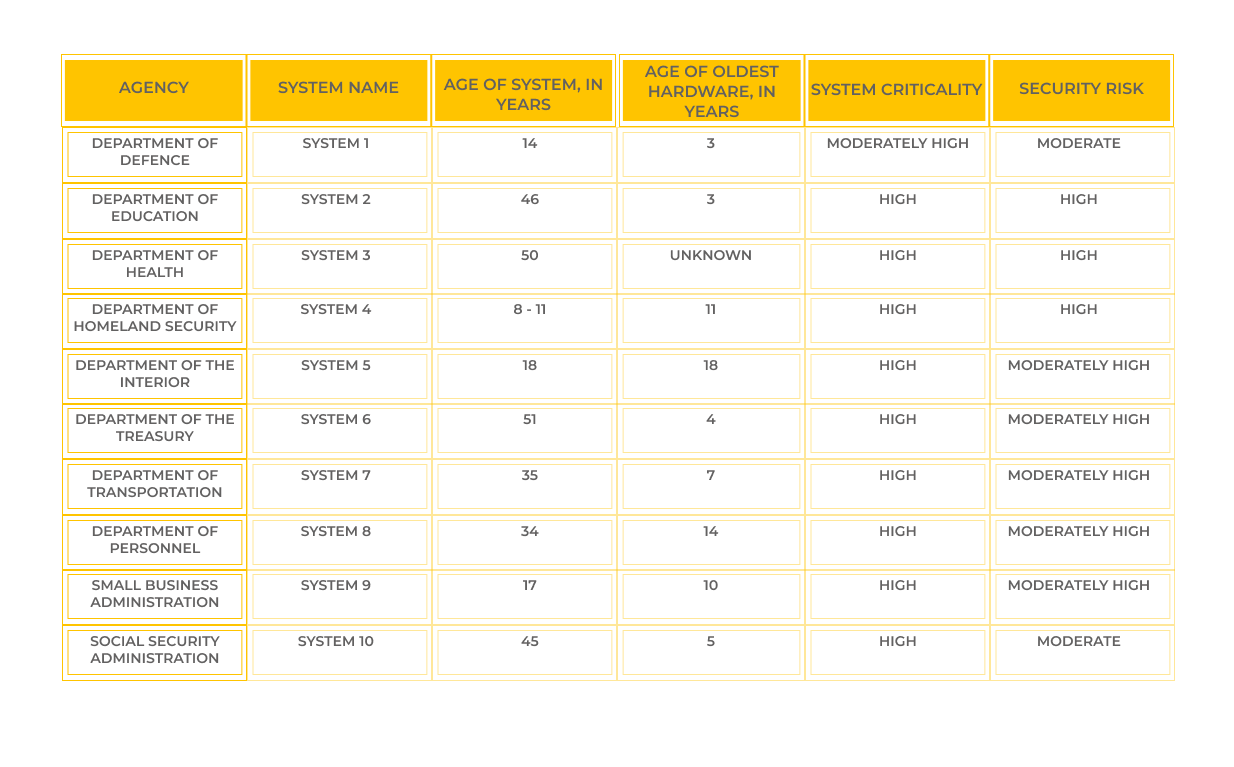
The truth is that the legacy systems, especially in healthcare, require constant updates and modernization. Otherwise, they may bring potential risk and crash anytime. When your company is already on track, and everything works fine, sometimes the last thing you want to do is stop all activities and check if your software needs an update. On the other side, you can risk keeping the outdated systems with patient data and losing important medical features that can raise your system’s effectiveness. Here we collected the main reasons for updating your healthcare software.
1. Рrotecting your data
The latest updates usually have the best security practices. Older versions of software may not maintain the same protection level, so you can never be sure if all sensitive data is safe.
2. Compliance with cybersecurity laws
If you want to have a modern healthcare application, it’s critical to avoid security breaches and regularly update all software systems. The latest cybersecurity laws put pressure on healthcare providers for securing sensitive patient data. It’s better not to risk by breaking the cybersecurity laws avoiding the newest software updates.
3. Using all the latest software features
Software updates are also significant in improved functionality and more features to enhance your customers’ experience and make it more seamless. It can be essential to be ahead of your competitors on the market and deliver a great innovative product.
The influence of COVID
As an industry expert, with the start of the COVID-19 pandemic, UppLabs was interested in finding out how the outbreak influenced the industry’s state and what changes business owners were forced to accept. The ability to predict industry innovation is crucial to venture capitalists and others interested in the healthcare industry.
The truth is that faced with chaos at the start of the pandemic, healthcare workers have embraced digital changes that have been prevalent in other industries for years. The McKinsey Analytics Center has calculated that global revenues from digital medicine like telemedicine, online pharmacies, or biotechnology will grow from $350 billion this year to $600 billion in 2024.
Stakeholders are actively investing their money into a new industry, as the demand for digital medicine is overgrowing. Technologies such as sensors, computing, and data analysis are becoming more widespread, especially this year after the outbreak of COVID-19, because the risk of spreading the disease makes remote digital medicine quite “attractive.”
Here are some examples of how pandemic influenced the development of digital healthcare:
- The regulators around the world are encouraging digital health providers to open up their closed systems.
- The EU promotes an electronic standard for medical records.
- In August, the Indian government unveiled a plan for digital healthcare modernization.
- French firm “Doctolib” claims its video consultations in Europe have grown from 1,000 to 100,000 per day this year.
- The Chinese health internet portal “Ping An Good Doctor” is gaining massive popularity in Southeast Asia.
- Amazon is working on its digital assistant, Alexa, that will be able, with the user’s permission, to analyze the cough and report whether it could be a “coronavirus cough.” In November, they launched a digital pharmacy to take over America’s drug distribution from pharmaceutical firms, resellers, and retailers.
- Tech giant Apple has developed nearly 50,000 “health apps” that can be installed on the iPhone.
- The German medical technology company Siemens Healthineers is partnering with the American hospital network Geisinger to expand remote patient monitoring.
- Patients at Apollo Hospitals in India can use a unique app for medicine restocking and online consultation with doctors.
These examples of medicine digitalization herald a “new era” for digital medicine, helping healthcare evolve.
How to estimate an update of your legacy healthcare system?
While estimating your legacy healthcare system’s state, you will need some strategies to understand if your software meets your current needs and potential requirements.
There exist several strategies that can be used in this case:
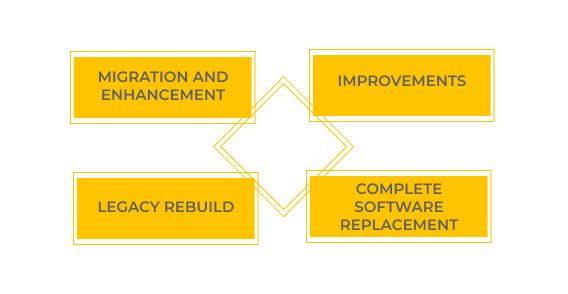
- Migration and enhancement
transferring part of your data to the cloud and upgrading your local infrastructure’s remaining components. - Improvements
changing some minor system features and calculating potential growth. - Legacy Rebuild
keeping the core features of your software and incorporating additional modules. - Complete software replacement
replacing your current software with new solutions.
The involvement of a third party with proven expertise in evaluating and then implementing the right solutions for your business needs could solve the legacy systems challenge. UppLabs team can tell you what to do if your system is outdated and estimate whether it should be maintained in the same state, or it’s better to update it. If you decide to upgrade your software, we will take care of:
- the roadmap,
- fast release loop (release of the new products regularly),
- simple vendor onboarding,
- GDPR,
- certifications compliance,
- cost-effectiveness
How UppLabs can help
Over the last seven years, we mastered our skills and gained experience in creating innovative, reliable, secure, and sophisticated healthcare products and applications. UppLabs obtain strong Healthcare industry expertise, so if you’re looking for help, we’ll be glad to assist you!
We provide business and software development support during the COVID-19 pandemic.
UppLabs is proficient in:
- Data management solutions for hospitals and clinics
We create highly reliable systems to support interactive communication between doctors, patients, and medication suppliers to improve healthcare quality.
- Complex system integration with medical devices and medical software
UppLabs actively uses the best cloud-based platforms, Google, Amazon, Microsoft, and the best world practices, to build secure and reliable solutions for our clients.
- Custom healthcare web and mobile applications’ development for:
- Symptoms identification and analysis systems that automatically connect users with a particular doctor
- Staff and patient management systems in clinics
- Health monitoring systems
- Doctors’ marketplace
- Online consultation systems
- VR and AR healthcare software development
UppLabs deliver end-to-end virtual, augmented, and mixed healthcare reality solutions for all popular devices.
- Development of HIPAA-compliant and secure software
We have huge experience with compliance and security regulations in the healthcare industry.
Ask UppLabs about the experience of working with top-notch digital healthcare solutions!
